Related Research Articles
Áine is an Irish goddess of summer, wealth, and sovereignty. She is associated with midsummer and the sun, and is sometimes represented by a red mare. She is the daughter of Egobail, the sister of Aillen and/or Fennen, and is claimed as an ancestor by multiple Irish families. As the goddess associated with fertility, she has command over crops and animals and is also associated with agriculture.

Garret Desmond FitzGerald was an Irish Fine Gael politician, public intellectual, economist and barrister who served twice as Taoiseach, serving from 1981 to 1982 and 1982 to 1987. He served as Leader of Fine Gael from 1977 to 1987 and was twice Leader of the Opposition between 1977 and 1982; he was previously Minister for Foreign Affairs from 1973 to 1977. FitzGerald served as a Teachta Dála (TD) from 1969 to 1992 and was a Senator for the Industrial and Commercial Panel from 1965 to 1969.
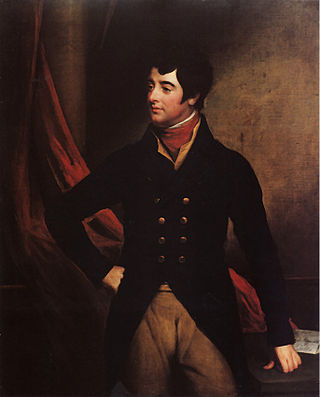
Lord Edward FitzGerald was an Irish aristocrat and nationalist. He abandoned his prospects as a distinguished veteran of British service in the American War of Independence, and as an Irish Parliamentarian, to embrace the cause of an independent Irish republic. Unable to reconcile with Ireland's Protestant Ascendancy or with the Kingdom's English-appointed administration, he sought inspiration in revolutionary France where, in 1792, he met and befriended Thomas Paine. From 1796 he became a leading proponent within the Society of United Irishmen of a French-assisted insurrection. On the eve of the intended uprising in May 1798, he was fatally wounded in the course of arrest.

Duke of Leinster is a title and the premier dukedom in the Peerage of Ireland. The subsidiary titles of the Duke of Leinster are: Marquess of Kildare (1761), Earl of Kildare (1316), Earl of Offaly (1761), Viscount Leinster, of Taplow in the County of Buckingham (1747), Baron of Offaly, Baron Offaly (1620) and Baron Kildare, of Kildare in the County of Kildare (1870). The viscounty of Leinster is in the Peerage of Great Britain, the barony of Kildare in the Peerage of the United Kingdom, and all other titles in the Peerage of Ireland. The courtesy title of the eldest son and heir of the Duke of Leinster is Marquess of Kildare. The Duke of Leinster is the head of the House of Kildare.

William Vesey-FitzGerald, 2nd Baron FitzGerald and Vesey, was an Anglo-Irish statesman. A Tory, he served in the governments of Lord Wellington and Robert Peel, but is best known for his defeat in the 1828 Clare by-election, hastening Catholic Emancipation across Britain and Ireland.

Earl of Desmond is a title of nobility created by the English monarch in the peerage of Ireland. The title has been created four times. It was first awarded in 1329 to Maurice FitzGerald, 4th Baron Desmond, a Hiberno-Norman lord in Southwest Ireland, and it was held by his descendants until 1583 when they rose against the English crown in the Desmond Rebellions. Following two short-lived recreations of the title in the early 1600s, the title has been held since 1628 by the Feilding family of Warwickshire, England. The current holder is Alexander Feilding, 12th Earl of Denbigh and 11th Earl of Desmond.
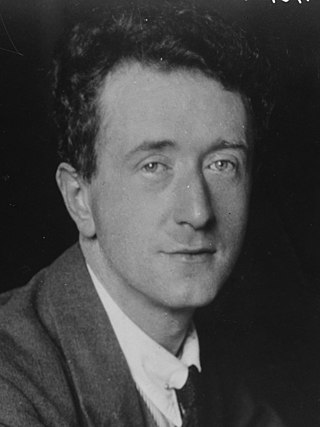
Desmond FitzGerald was an Irish revolutionary, politician, and poet, known for his role in the Irish independence movement and for his ministerial roles in Irish governments; he was Director of Publicity from 1919 to 1921, Minister for Publicity from 1921 to 1922, Minister for External Affairs from 1922 to 1927 and finally Minister for Defence from 1927 to 1932. Born in London to an Irish family, FitzGerald moved to Paris in his early twenties, where he became involved in the Imagist group of poets. In 1913, FitzGerald returned to Ireland and the next year became active in the Irish Volunteers, a paramilitary organisation that sought Irish independence from Britain. FitzGerald partook in the Easter Rising of 1916 in Dublin and was subsequently imprisoned for two years by the British.

James Edward FitzGerald was a New Zealand politician. According to some historians, he should be considered the country's first premier, although a more conventional view is that neither he nor his successor should properly be given that title. He was a notable campaigner for New Zealand self-governance. He was the first Superintendent of the Canterbury Province.
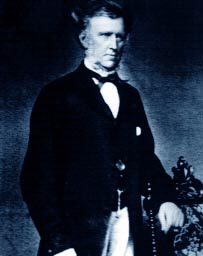
Charles Fitzgerald was an officer in the British Royal Navy and Governor of The Gambia from 1844 until 1847, then Governor of Western Australia from 1848 to 1855.
James FitzGerald-Kenney was an Irish Fine Gael politician and barrister who served as Minister for Justice from 1927 to 1932. He served as a Teachta Dála (TD) for the Mayo South constituency from 1927 to 1944.
Tom Fitzgerald or Thomas Fitzgerald, Thomas FitzGerald may refer to:
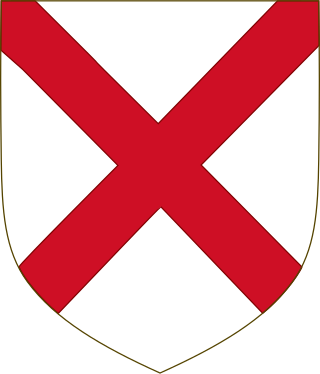
The FitzGerald dynasty is a Hiberno-Norman noble and aristocratic dynasty, originally of Cambro-Norman and Anglo-Norman origin. They have been peers of Ireland since at least the 13th century, and are described in the Annals of the Four Masters as having become "more Irish than the Irish themselves" or Gaels, due to assimilation with the native Gaelic aristocratic and popular culture. The dynasty has also been referred to as the Geraldines and Ireland's largest landowners. They achieved power through colonisation and the conquest of large swathes of Irish territory by the sons and grandsons of Gerald de Windsor. Gerald de Windsor was the first Castellan of Pembroke Castle in Wales, and became the male progenitor of the FitzMaurice and FitzGerald Dynasty. His father, Baron Walter FitzOther, was the first Constable and Governor of Windsor Castle for William the Conqueror, and was the Lord of 38 manors in England, making the FitzGeralds one of the "service families" on whom the King relied for his survival. Some of its members became the Black Knights, Green Knights and White Knights.

Gerald FitzGerald, 14th Earl of Desmond, also counted as 15th or 16th, owned large part of the Irish province of Munster. In 1565 he fought the private Battle of Affane against his neighbours, the Butlers. After this, he was for some time detained in the Tower of London. Though the First Desmond Rebellion took place in his absence, he led the Second Desmond Rebellion from 1579 to his death and was therefore called the Rebel Earl. He was attainted in 1582 and went into hiding but was hunted down and killed.
Ennis is a former United Kingdom Parliament constituency in Ireland, returning one MP. It was an original constituency represented in Parliament when the Union of Great Britain and Ireland took effect on 1 January 1801.
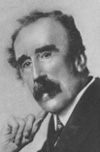
Percy Hetherington Fitzgerald was an Anglo-Irish author and critic, painter and sculptor.
Robert Fitzgerald (1910–1985) was an American classicist and translator of ancient Greek and Latin
Sir Maurice FitzGerald, 18th Knight of Kerry was an hereditary knight and an Irish Whig politician.

James FitzGerald, 6th Earl of Desmond, called 'the Usurper', was a younger son of Gerald FitzGerald, 3rd Earl of Desmond, and Lady Eleanor, daughter of James Butler, 2nd Earl of Ormond.

James fitz John FitzGerald, 13th Earl of Desmond, also counted as the 14th, ruled 22 years, the first 4 years as de facto earl until the death of James FitzGerald, de jure 12th Earl of Desmond, called Court Page, who was murdered by James fitz John's brother Maurice fitz John FitzGerald, called Totane. James fitz John FitzGerald maintained himself in power by skilful diplomacy, avoiding armed conflict and destruction. He was appointed Lord Treasurer of Ireland in 1547.

FitzGerald or Fitzgerald, is an Irish surname of Hiberno-Norman origin. It is a patronymic derived from the prefix Fitz- from the Latin filius- plus Gerald, thus meaning "son of Gerald”. In Goidelic languages, e.g. the Irish language, it is rendered Mac Gearailt.
References
- 1 2 3 "Thomas Fitzgerald". Centre for the Study of the Legacies of British Slavery. University College London. Retrieved 22 September 2022.
- ↑ Stenton, Michael (1976). Who's Who of British Members of Parliament. Vol. 1. Hassocks: Harvester Press. p. 141. ISBN 0855272198.